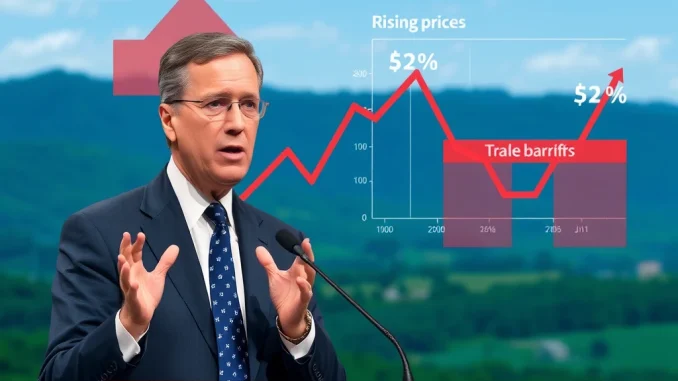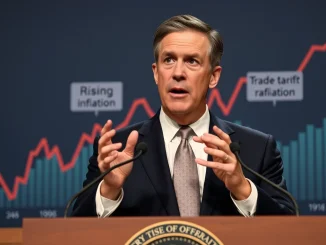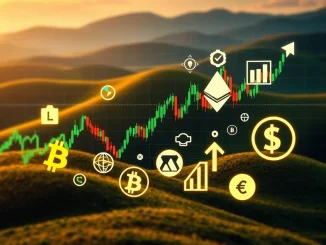
Macroeconomic news, especially statements from the Federal Reserve, often sends ripples through financial markets, including the dynamic world of cryptocurrencies. Understanding these signals is key for navigating market volatility. Recently, Jerome Powell, the Chairman of the Federal Reserve, addressed the potential economic impact of tariff policy, a topic that holds significant weight for global trade and domestic price stability. His comments highlighted a potential challenge: the risk that increased tariffs could fuel inflation and dampen economic activity.
Jerome Powell on Tariffs and Economic Headwinds
Federal Reserve Chairman Jerome Powell provided a clear assessment regarding the potential effects of tariffs. He indicated that the outcome of tariff policies isn’t uniform; it depends heavily on the specific level and scope of the tariffs implemented. Higher tariffs, in particular, raise concerns. Powell pointed out that significant tariff hikes could impose a burden on economic activity. This means potentially slower growth, reduced investment, and less robust consumer spending.
More critically for the average consumer and investor, Powell highlighted the potential for these tariff increases to lead to an increase in inflation. Inflation, the general rise in prices for goods and services, erodes purchasing power. When import costs rise due to tariffs, businesses often pass those costs onto consumers, contributing to higher prices across various sectors.
How Do Tariffs Impact Inflation and Economic Activity?
The link between tariffs, inflation, and economic activity is multifaceted. Here’s a breakdown:
- Increased Import Costs: Tariffs are taxes on imported goods. When these taxes go up, the cost for domestic businesses to import raw materials, components, or finished products increases.
- Reduced Competition: Tariffs make imported goods more expensive, potentially reducing competition for domestic producers. While this might benefit some local industries, it can also allow them to raise prices without fear of being undercut by cheaper imports.
- Supply Chain Disruptions: Uncertainty or changes in tariff policy can disrupt established supply chains, leading to inefficiencies and higher costs for businesses.
- Impact on Economic Activity: Higher costs for businesses can lead to reduced profitability, potentially curbing investment and hiring. For consumers, higher prices due to inflation can reduce discretionary spending, slowing overall economic growth.
Powell’s warning underscores the delicate balance policymakers face. While tariffs might be intended to protect specific domestic industries, they carry the risk of broader negative consequences for the economy, including the unwelcome combination of slower growth and rising prices – a scenario known as stagflation, though Powell didn’t explicitly use that term.
Why Does This Matter for Crypto Investors?
You might wonder why comments from the Federal Reserve Chairman about tariffs and inflation are relevant to your crypto portfolio. Here’s the connection:
- Inflation Hedge Narrative: Bitcoin and some other cryptocurrencies are often viewed by investors as potential hedges against inflation. If tariffs contribute to higher inflation, the appeal of assets perceived as scarce or outside traditional financial systems could increase. Investors might seek alternatives to traditional currencies losing purchasing power.
- Federal Reserve Policy Response: The Federal Reserve’s primary mandates are maximum employment and price stability (controlling inflation). If inflation rises significantly, especially if it’s seen as persistent, the Fed might be compelled to adjust monetary policy, such as raising interest rates. Higher interest rates generally make borrowing more expensive and can reduce liquidity in the financial system, which can put downward pressure on risk assets like stocks and cryptocurrencies.
- Economic Activity and Risk Appetite: A slowdown in economic activity can reduce overall investor confidence and risk appetite. During periods of economic uncertainty or contraction, investors may move away from volatile assets like cryptocurrencies towards safer havens. Conversely, a robust economy often supports investment in riskier assets.
Powell’s comments serve as a reminder that external macroeconomic factors can significantly influence the environment in which cryptocurrencies trade. The interplay between government policy (tariffs), central bank actions (Federal Reserve interest rates), inflation, and overall economic health creates a complex backdrop for the crypto market.
Navigating Potential Economic Shifts
Given the potential for tariffs to impact inflation and economic activity, what does this mean for those interested in the crypto space? It reinforces the importance of:
- Staying Informed: Pay attention to macroeconomic indicators, central bank communications, and government policy decisions. These factors can provide clues about potential market movements.
- Understanding Inflation Dynamics: Educate yourself on the causes and effects of inflation and how different asset classes, including cryptocurrencies, might perform in inflationary environments.
- Considering Your Strategy: Reflect on how potential economic scenarios (e.g., higher inflation, slower growth) might align with your investment goals and risk tolerance.
While cryptocurrencies operate on decentralized networks, their market valuation is influenced by the broader financial ecosystem and global economic conditions. Jerome Powell’s warning about tariffs is a piece of that larger puzzle.
Conclusion: Watching the Horizon
Federal Reserve Chairman Jerome Powell has clearly articulated the risk that increased tariffs could act as a double-edged sword: weighing on economic activity while potentially boosting inflation. This presents a challenging scenario for the economy. For participants in the cryptocurrency market, these macroeconomic shifts are not just distant headlines. They can influence investor sentiment, the perceived value of assets like Bitcoin as inflation hedges, and the overall liquidity and risk appetite in the market. Keeping a close watch on how these potential economic headwinds develop and how the Federal Reserve responds will be crucial for understanding the broader context influencing crypto asset performance.



